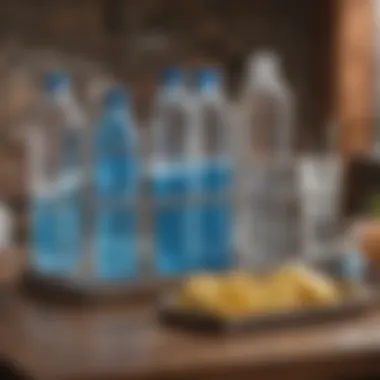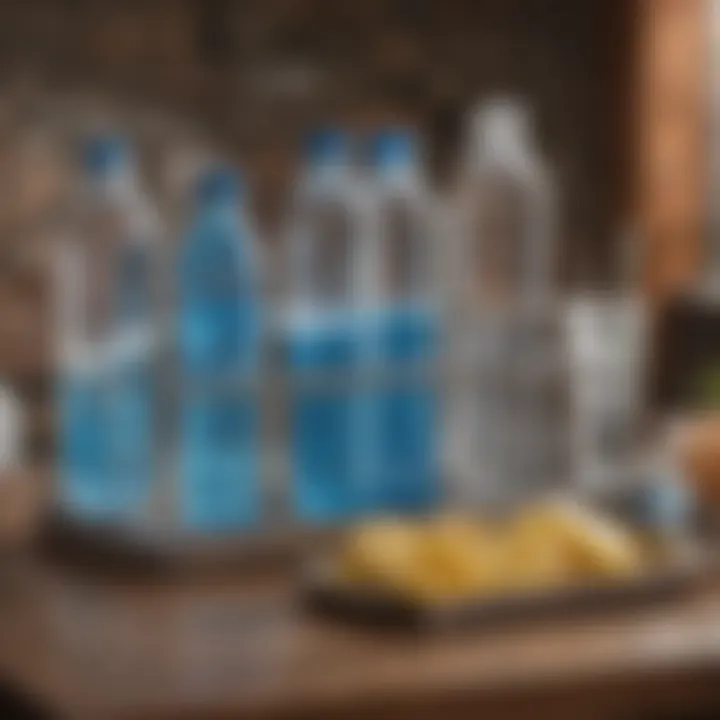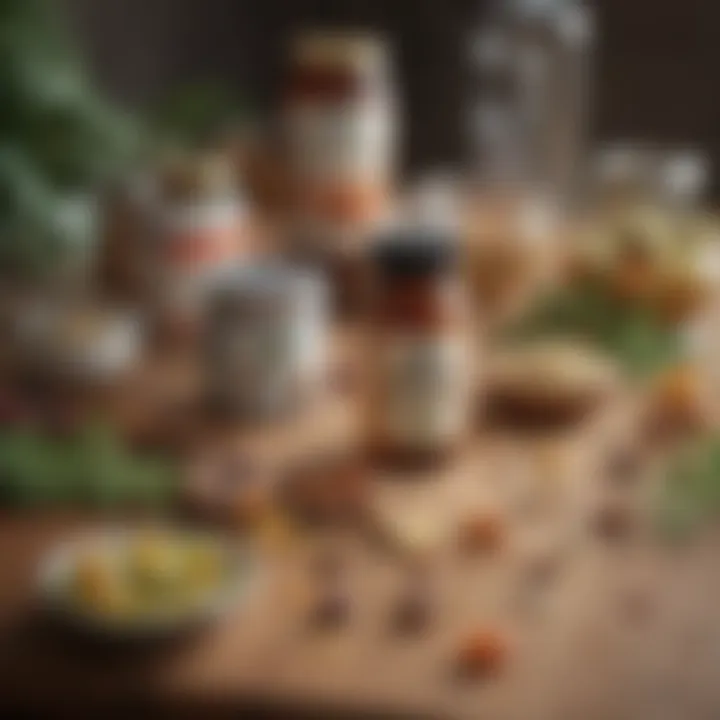Effective Strategies for Overcoming a Hangover


Intro
Experiencing a hangover can be a daunting reality for many. The discomfort often manifests in various forms, including headaches, nausea, fatigue, and dehydration. Understanding the causes of these symptoms is key to effective recovery. When alcohol enters the body, it can lead to dehydration and electrolyte imbalances, primarily due to increased urination and its effect on the central nervous system. The type and amount of alcohol consumed, along with individual factors such as metabolism and hydration levels, all play significant roles in the severity of a hangover.
The good news is that there are strategies to alleviate these discomforting symptoms. This guide will delve into scientifically backed methods that can aid recovery, focusing on essential aspects such as hydration, nutrition, and rest. By employing these methods, individuals can hope to regain their sense of well-being more quickly. With awareness and preparation, navigating through the effects of excessive alcohol consumption can become more manageable.
Recipe Overview
Recipe Name and Description
This section will outline a hydrating recovery drink that is effective for restoring lost nutrients and alleviating hangover symptoms. This drink, often referred to as a rehydration solution, combines natural ingredients that help replenish electrolytes and fluids lost during alcohol consumption.
Cuisine Type
The drink falls under the category of traditional home remedies, often seen across various cuisine types as individuals seek natural methods to recover from a hangover.
Ingredients List
Detailed Ingredient Breakdown
The following components create a well-rounded recovery drink:
- Coconut Water: Known for its high potassium content, it aids in hydration and replenishing electrolytes.
- Fresh Lemon Juice: Provides vitamin C and can help reduce the acid levels in the stomach, easing nausea.
- Honey: Serves as a natural sweetener that can help provide energy.
- Salt: A small amount can help restore sodium levels lost during alcohol consumption.
Substitutions for Dietary Needs
Some individuals may have dietary restrictions. Here are alternatives:
- For those with diabetes or watching sugar intake, an artificial sweetener could replace honey.
- If allergic to coconuts, alternative electrolyte drinks can be utilized, ensuring they are low in sugar.
Staying hydrated is the first and most important step in recovering from a hangover. Lack of fluids exacerbates symptoms by impairing physical and mental vitality.
Prologue to Hangovers
Understanding hangovers is crucial for anyone who partakes in alcoholic beverages, whether socially or as a form of relaxation. This section serves as a foundation for the subsequent discussions about the causes, effects, and remedies associated with hangovers. Acknowledging what a hangover is, and why it occurs, is the first step in effectively managing and mitigating its impact.
Defining a Hangover
A hangover can be described as a collection of unpleasant symptoms that manifest after the consumption of alcoholic beverages. Symptoms can include headache, nausea, fatigue, and dizziness. The severity of these symptoms often depends on the amount and type of alcohol consumed, as well as individual differences in metabolism and tolerance. Generally, hangovers occur as a result of dehydration, the accumulation of toxins, and the disruption of normal bodily functions.
These symptoms arise due to several physiological responses, including inflammation and the rehydration process that the body initiates after alcohol intake. Recognizing that a hangover is not just a mere inconvenience but a complex interplay of bodily reactions is vital for developing effective remedies.
Prevalence and Impact
Hangovers are a common experience across various cultures and demographics, impacting millions of individuals worldwide. Studies show that about 75% of those who drink alcohol will experience a hangover at some point. The social and economic implications of hangovers are significant, often resulting in decreased productivity at work and an increase in absenteeism. Moreover, the discomfort and distress tied to hangovers can influence individuals' drinking habits and social activities.
Certain groups, such as young adults and college students, report higher incidences of hangovers due to patterns of drinking during social events. It's important to consider how the impact of hangovers extends beyond personal discomfort. These experiences can affect interpersonal relationships and overall quality of life.
Overall, understanding hangovers can lead individuals to make more informed decisions regarding alcohol consumption, ultimately promoting healthier drinking behaviors.
Causes of Hangovers
Understanding the causes of hangovers is crucial for effectively addressing the symptoms that follow excessive alcohol consumption. A hangover is not a simple reaction; it involves various physiological processes triggered by alcohol intake. By identifying these causes, individuals can better equip themselves with strategies to prevent and relieve the discomfort associated with a hangover. Recognizing elements such as dehydration, the buildup of toxic substances, and the quality of the consumed alcohol provides valuable insight into mitigating future hangovers.
Dehydration and Electrolyte Imbalance
Dehydration plays a primary role in the hangover experience. Alcohol is a diuretic, which means it promotes urination. This increased urination leads to fluid loss, resulting in dehydration. When the body lacks adequate fluids, several symptoms often arise; these include dry mouth, fatigue, and headaches. The effect on electrolyte levels is significant as well. Electrolytes like sodium and potassium are essential for various bodily functions. If these are depleted due to excessive alcohol intake, the balance is disrupted, amplifying hangover symptoms.


To combat dehydration, one should focus on hydration strategies both during and after drinking. Many people overlook the importance of drinking water, which can significantly reduce the severity of a hangover. It is advisable to alternate alcoholic beverages with water throughout the night. After drinking, electrolyte-rich beverages, such as sports drinks, can assist in restoring lost electrolytes and rehydrating the body more effectively.
Acetaldehyde and Other Toxic Byproducts
When alcohol is metabolized, it transforms into acetaldehyde, a substance that can have toxic effects on the body. Acetaldehyde is considered more toxic than alcohol itself. This byproduct leads to many hangover symptoms, including nausea and headaches. The body gradually breaks down acetaldehyde into acetic acid, which is less harmful. However, if alcohol is consumed in large quantities, the accumulation of acetaldehyde may outpace this conversion process, worsening hangover symptoms.
Moreover, other toxic byproducts produced during alcohol metabolism can contribute to the discomfort experienced during a hangover. Understanding the role of these substances reinforces the importance of moderation in alcohol consumption. Reducing consumption or pacing drinking with non-alcoholic beverages may lessen the impact of these toxic byproducts on the body.
Congeners and Alcohol Quality
Congeners are chemical compounds that are produced during fermentation. They contribute to the flavor, color, and aroma of alcoholic beverages. Darker spirits, such as whiskey and red wine, often contain higher levels of congeners compared to lighter drinks like vodka or gin. Studies suggest that different congeners may influence the severity of hangovers.
Choosing beverages with lower congener content can potentially lead to less severe hangovers. Additionally, the overall quality of the alcohol affects how the body reacts. Higher-quality spirits typically undergo better distillation processes, which may result in fewer impurities and congeners. Consumers should be aware of the types of drinks they choose and prioritize quality over quantity to mitigate hangover effects.
In summary, understanding the causes of hangovers—including dehydration, toxic byproducts, and the quality of consumed alcohol—can greatly aid in preventing and easing symptoms. Addressing these factors helps to foster responsible drinking habits, ultimately leading to a better drinking experience.
Preventive Measures
Preventive measures play a crucial role in mitigating the effects of hangovers. By taking proactive steps before indulging in alcoholic beverages, individuals can significantly reduce the severity of the aftermath. Understanding how these preventive strategies function can empower drinkers to make informed choices, therefore enhancing their overall experience while minimizing negative consequences. Each component of prevention has unique benefits that contribute to overall wellbeing even after a night of drinking.
Hydration Strategies Before Drinking
Adequate hydration is essential in preempting the dehydration typically associated with hangovers. Alcohol acts as a diuretic, leading to increased urine output and fluid loss. This fluid imbalance can amplify common hangover symptoms such as headaches and fatigue.
To combat this, implementing hydration strategies before drinking is necessary:
- Drink Water: Make it a habit to consume water before, during, and after consuming alcohol. Aim for at least one glass of water for every alcoholic drink consumed. This can help maintain fluid levels in the body.
- Electrolyte Solutions: Consider drinking electrolyte-rich beverages like coconut water or sports drinks. These help replenish the minerals and salts lost during alcohol consumption.
- Limit Caffeinated Beverages: Caffeine can further dehydrate the body. If choosing to consume coffee or energy drinks, it’s crucial to balance them with additional water intake.
By prioritizing hydration before any drinking session, the body can manage alcohol's effects more efficiently, leading to a smoother recovery.
Choosing the Right Beverages
The type of alcoholic beverage consumed plays a pivotal role in determining the intensity and likelihood of a hangover. Different drinks contain varying levels of alcohol and congeners, which can influence how one feels the next day.
When considering beverage selection, keep the following in mind:
- Opt for Clear Liquors: Alternatives like vodka or gin typically contain fewer congeners than dark liquors such as whiskey or rum. Fewer congeners often correlate with milder hangovers.
- Be Mindful of Mixers: Sugary mixers or juices may worsen hangover symptoms. Choosing soda water, for example, can be a better option. Less sugar means a lower chance of dehydration and sugar crashes.
- Quality Over Quantity: Investing in higher quality alcoholic beverages can lead to fewer side effects. Cheaper alcohol often contains impurities that can exacerbate hangover symptoms.
Choosing the right drinks not only makes for a more enjoyable experience but also aids in preventing potential hangover pitfalls.
Eating Before and During Drinking
Food intake plays a significant role in how alcohol affects the body. Consuming food before and during drinking can slow down alcohol absorption, reducing its impact on the system.
Here are key considerations regarding eating habits:
- Sustaining Fats and Proteins: Eating meals rich in fats and proteins prior to drinking can create a buffer in the stomach. This slows the absorption of alcohol and mitigates its effects.
- Stay Nourished with Healthy Snacks: Bringing nutritious snacks can help maintain energy levels during a night out. Foods rich in complex carbohydrates and healthy fats can be particularly beneficial.
- Avoid Drinking on an Empty Stomach: Skipping meals can lead to faster intoxication, increasing the likelihood of unpleasant aftereffects. Consuming a balanced meal ensures that the body has the necessary tools to process alcohol more effectively.
Incorporating food strategies is a practical and effective measure for reducing hangover severity, allowing for a more pleasurable drinking experience.
Immediate Remedies for Hangover Relief
Immediate remedies for hangover relief are crucial in mitigating the unpleasant symptoms that accompany excessive alcohol consumption. These strategies aim to restore balance to the body and promote quicker recovery. Addressing hydration, nutritional support, and rest are key aspects of this section. Each remedy provides unique benefits and considerations, crucial for anyone seeking to alleviate the effects of a hangover.
Rehydration Techniques
Water Consumption


Water consumption is fundamental to combating dehydration caused by alcohol. Alcohol is a diuretic, which means it increases urine production and leads to significant fluid loss. When rehydrating, the primary benefit is restoring proper hydration levels in the body. Water is uniquely accessible and does not contain any sugars or artificial ingredients, making it a favorable choice for recovery. However, it lacks electrolytes, which are also important for rehydration.
Electrolyte Drinks
Electrolyte drinks often contain a combination of water, salts, and sugars, which can effectively replenish lost electrolytes due to dehydration. The key characteristic of these drinks is their ability to restore not just fluid balance but also mineral balance in the body, like sodium and potassium. This makes them a popular choice for providing sustained relief from hangover symptoms. On the downside, some electrolyte drinks may contain high sugar levels, leading to more discomfort for some individuals.
Herbal Remedies
Herbal remedies, such as ginger or peppermint tea, can soothe the stomach and provide hydration simultaneously. The benefit of herbal remedies lies in their natural ingredients that can ease nausea and discomfort. Ginger, for instance, is well-regarded for its anti-nausea properties. One disadvantage is that these remedies may vary in effectiveness from person to person, and finding the right herbal solution could take time.
Nutritional Support
Foods Beneficial for Recovery
Consuming foods beneficial for recovery is essential for replenishing lost nutrients after a night of drinking. Foods that are rich in vitamins and minerals can restore energy levels and replenish the body's stores. Bananas and eggs are examples of good recovery foods, as they provide potassium and amino acids, respectively. On the downside, some people may struggle with appetite post-drinking, making it challenging to consume necessary nutrients.
Supplements to Consider
Certain supplements can aid in recovery, particularly those that focus on hydration and nutrient replenishment. For example, vitamin B complex and vitamin C can help speed up recovery through their role in metabolism and immune function. These supplements are beneficial as they target specific nutrient deficiencies that may arise after drinking. Some disadvantages include potential interactions with medications and the risk of over-supplementation, which may not be safe for everyone.
Rest and Sleep Quality
Rest and sleep quality often suffer during times of heavy alcohol consumption. Quality sleep can significantly aid in recovery from a hangover, enhancing the body's repair processes. It is important to allow time for the body to recuperate, as many people overlook this aspect, thinking they can power through the discomfort. Prioritizing sleep can improve overall well-being and reduce the duration of hangover symptoms, making it an essential aspect for recovery.
Pharmaceutical Options
Pharmaceutical options play a crucial role in addressing hangover symptoms. They provide targeted relief and can alleviate discomfort quickly. Understanding these options allows individuals to make informed decisions. Moreover, knowing which medications to use can enhance recovery and improve overall well-being after excessive drinking.
Over-the-Counter Medications
Pain Relievers
Pain relievers are widely used due to their ability to reduce headaches and body aches associated with hangovers. They work by blocking pain signals in the brain. The most popular choices include ibuprofen and acetaminophen.
A significant characteristic of pain relievers is their fast action. This immediate response makes them a favored option for hangover relief. For many, taking a pain reliever at the onset of a hangover can provide much-needed comfort.
However, there are unique features to consider. For instance, aspirin and ibuprofen can irritate the stomach lining, especially after alcohol consumption. This irritation can sometimes exacerbate nausea, creating a dilemma for the user. While these medications are effective, one must weigh their benefits against potential side effects.
Antacids
Antacids serve to neutralize stomach acid, making them beneficial for those experiencing nausea and upset stomach post-drinking. They can provide quick relief from discomfort associated with hangovers.
The key characteristic of antacids is their ability to alleviate digestive issues rapidly. Products like Tums or Maalox are common choices for immediate relief. For individuals suffering from acid reflux or heartburn, these medications can be particularly helpful.
While antacids are effective, they also have unique features that come with them. They might not address headaches or fatigue directly, which means they should be part of a broader strategy for hangover relief. Additionally, regular use can lead to dependency, which might complicate future digestive health.
Potential Side Effects of Medications
Although over-the-counter medications offer relief, they also come with potential side effects. For example, prolonged use of pain relievers may lead to liver damage or gastrointestinal issues.
Similarly, antacids can cause constipation or diarrhea if taken excessively. It is important to exercise caution. One should always adhere to recommended dosages and consult with a healthcare provider if uncertain.
Overall, understanding the benefits and drawbacks of pharmaceutical options is essential for effective hangover management. These medications can provide significant relief but must be used wisely to avoid health complications.
Long-Term Strategies for Responsible Drinking
In the journey to understand how to effectively navigate the effects of hangovers, it is crucial to explore long-term strategies for responsible drinking. This aspect raises awareness about the importance of moderation and informed choices regarding alcohol consumption. By adopting responsible drinking habits, individuals can significantly reduce the risk of experiencing hangover symptoms in the first place.


Implementing smart strategies can also promote healthier lifestyles overall, encouraging individuals to derive pleasure from social activities without suffering negative consequences. Consider the following key elements:
- Education: Knowledge about alcohol content and how different beverages impact the body is essential. Understanding how one's body metabolizes alcohol can aid in making more informed choices.
- Mindful Consumption: Being aware of how much you drink allows for better control. Keeping track of intake can prevent overindulgence.
- Cultural Shifts: Engaging in open discussions about alcohol use can help to redefine societal norms that often glorify excessive drinking.
Understanding Personal Limits
Personal limits refer to the maximum amount of alcohol an individual can consume without adverse consequences. Recognizing these limits is a critical component of responsible drinking. Many factors contribute to defining personal limits, including:
- Body Weight and Composition: Heavier individuals may process alcohol more effectively than lighter counterparts.
- Tolerance Levels: Regular drinkers often develop a higher tolerance, leading to potential overconsumption.
- Health Conditions: Certain medical conditions might intensify the effects of alcohol, thus lowering personal limits.
- Current Medication: Some medications can interact negatively with alcohol, influencing its effects and leading to hangovers.
Understanding these factors enables people to make conscious and calculated choices during social drinking situations. Testing personal limits safely can help clarify one's threshold and avoid hangover consequences.
Alternatives to Alcohol Consumption
Exploring alternatives to alcohol can provide social enjoyment without the risks. Here are several options to consider:
- Non-Alcoholic Beverages: There are numerous high-quality non-alcoholic drinks available today, which allow individuals to partake socially without consuming alcohol. Examples include non-alcoholic beers and cocktail alternatives.
- Mocktails: A mix of juices, sodas, and herbs, mocktails offer delightful flavors without the alcohol. They can serve as an engaging option during social gatherings.
- Social Activities: Engaging in activities that do not revolve around drinking can create memorable shared experiences, such as sports, games, or art classes.
- Mindfulness and Meditation: Developing mindfulness can foster improved decision-making when it comes to alcohol consumption. Meditation can help individuals cultivate a better relationship with drinking, focused on well-being rather than escapism.
"Responsible drinking is not just about limiting intake; it is about making informed choices that promote health and social enjoyment without consequences."
Adopting these long-term strategies enables individuals to cultivate healthier drinking habits. Balancing enjoyment with responsibility can lead to a more fulfilling social life, free from the burdens of hangovers.
Cultural Perspectives on Hangovers
Understanding the cultural perspectives on hangovers reveals much about how societies view drinking and its consequences. Each culture has its own remedies and traditions, shaped by historical and social factors. Acknowledging these elements not only broadens the understanding of hangovers but also aids in developing strategies for recovery and prevention. Insights into cultural attitudes toward alcohol consumption can inform responsible drinking practices and emphasize the importance of moderation.
Global Remedies and Traditions
Various cultures possess unique remedies to treat hangovers, showcasing their distinct approaches to recovery. For instance, in Mexico, the "bloody maria” is popular. It combines vodka, tomato juice, and spices, believed to replenish nutrients lost during drinking. In South Korea, people often consume a soup called "haejangguk," which is made with beef broth and various vegetables. This dish is thought to soothe the stomach and restore energy.
Similarly, in the Philippines, many swear by the effectiveness of coconut water as a natural rehydration solution. This aligns with the general practice of consuming hydrating fluids to combat hangover symptoms. In Ireland, a traditional remedy includes a hearty breakfast, often laden with fats and carbs that supposedly help settle the stomach and energize the body. These diverse remedies highlight local culinary practices while underscoring the cultural view of hangovers as common, yet manageable experiences.
Alcohol Consumption Trends Across Cultures
Globally, alcohol consumption varies widely, influenced by factors such as religion, laws, and social norms. In countries like France and Italy, moderate wine consumption is embedded in daily life. It is often seen as a part of meals, leading to lower reported hangover cases. In contrast, cultures with stricter alcohol regulations may experience fewer hangovers due to limited exposure.
Additionally, trends show that younger generations are changing traditional drinking patterns. Many prefer cocktails or craft beers, which tend to have higher alcohol content, leading to increased hangover incidents. This shift prompts key discussions on the need for education regarding responsible drinking habits.
A noteworthy example is Japan, where the concept of "nomikai" (drinking parties) is prominent. While these social gatherings emphasize camaraderie, they also often lead to overindulgence and resultant hangovers. Understanding these cultural consumption trends can inform strategies to mitigate the effects of heavy drinking and promote healthier practices across different populations.
"Cultural perspectives on hangovers illuminate the shared human experience of recovery, showcasing unique remedies and attitudes toward alcohol consumption."
This exploration of global remedies and trends provides useful insights into how various societies tackle the challenge of hangovers, highlighting enriching traditions and the need for informed drinking habits. By incorporating cultural knowledge into discussions on alcohol consumption, individuals can adopt more effective strategies for prevention and recovery.
Culmination
The conclusion serves as an essential element in this article as it ties together the various strategies discussed for overcoming a hangover. It synthesizes the knowledge and practical tips to provide a clear framework for readers looking to alleviate their symptoms effectively. Understanding the multifaceted nature of hangovers—spanning hydration, nutrition, rest, and responsible drinking practices—enables individuals to approach recovery holistically.
Summary of Effective Strategies
In summary, effective strategies to combat a hangover include:
- Maintaining hydration before, during, and after alcohol consumption.
- Consuming nutrient-dense foods that can support recovery.
- Prioritizing restorative sleep to help the body heal.
- Considering the use of over-the-counter medications if necessary.
Implementing these practices not only mitigates the immediate discomfort but also sets the groundwork for healthier drinking habits in the future. A comprehensive approach not only eases hangover symptoms but also enhances overall well-being.
Emphasizing Responsible Drinking Practices
Responsible drinking is paramount to prevent the adverse effects of alcohol. By understanding personal limits, individuals can make informed choices regarding their consumption. Alternatives to alcohol, such as mocktails or non-alcoholic beers, can offer enjoyable experiences without the hangover aftermath.
Encouraging moderation and awareness raises the quality of social interactions and diminishes the reliance on alcohol for enjoyment. Building these habits can foster a healthier lifestyle, which is beneficial not just for oneself but also for the larger community.
"Taking control of your drinking habits leads to a more fulfilling and enjoyable life."
Ultimately, a comprehensive understanding of the body’s needs during recovery, combined with responsible drinking practices, empowers individuals to enjoy social situations without the unpleasant consequences that can follow.















